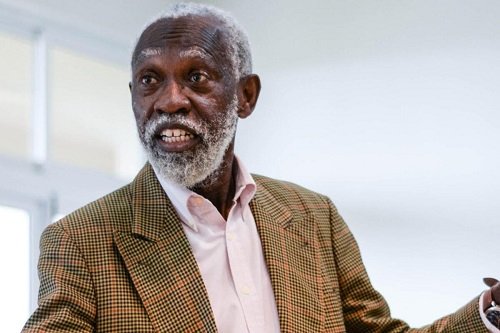Hot!
‘We shouldn’t see all teachers as hopeless over a few failures in licensure exam’ – Prof Adei

A former Rector of the Ghana Institute for Public Administration, GIMPA Prof. Stephen Adei, has urged critics and the public to desist from creating the impression that all teachers in the country are hopeless.
This follows a massive failure of teachers in the 2023 Ghana Teacher Licensure Examination organised by the National Teaching Council.
Speaking on JoyNews’ Upfront, on Wednesday, Prof Adei noted that the number of teachers that failed the exam is a small section compared to the over 300,000 teachers in the country, many of whom have successfully passed the exam.
He added that the teachers that failed in the 2023 May exams are those who failed previously in their multiple attempts to get through with the exams.
“When you look at the 7000, that are mostly repeated, the worst kind. You have over 350,000 teachers. So that’s why I’m saying you must put the 7,000 beside the over 350,000 so that you don’t give the impression that our teachers are all hopeless,” Prof Adei told the host, Isaac Kofi Agyei.
This comes after the National Teaching Council revealed that about 83.5% failed the teachers’ licensure exams held in May 2023.
The NTC noted that out of the 7,728 teachers who participated in the re-sit exams, only 1,277 passed.
The assessment in numeracy, literacy and professional knowledge is to enable qualified teachers to get a professional license, while attracting young graduates with the required professional knowledge and skills to teach.
Following the failure, the Registrar of the National Teaching Council (NTC), Christian Addai-Poku, told JoyNews that the teachers who failed would be given a last chance to re-sit.
However, some prospective students who are preparing to write the exams later this year
A student said, “most of us are doing our preparations on our own, some are relying on past questions, others have created a group to learn from each other.”
Another candidate said during the induction service they were advised to rely on pass questions as it was the best way to adequately prepare.
But Prof Adei believes that teachers do not have a right to demand for study material to aid them in adequately preparing for licensure exams.
According to him, although he has not seen the exam questions, most of the test materials are on topics that should be at the fingertips of professional teachers.
“I wish I had seen the examination because of what the NTC is saying, but basically for a teacher to be told that somebody should be given a syllabus on numeracy, just writing basic essay and you are a trained teacher and we are asking you about basic psychology, classroom management and the rest, and you say somebody should give you some material, you are indicting yourself,” he argued.
He stressed that the request by the teachers suggests that “ they are not qualified to be in the classroom.”
Hot!
Ghana Showcases Culture and Investment Potential at ITB Berlin 2026

Ghana Tourism Authority is leading Ghana’s participation at ITB Berlin, which opened in Berlin with a vibrant national pavilion highlighting Ghana’s rich cultural heritage, tourism destinations and investment opportunities.
March 5 has been designated as Ghana Day, a special platform to promote Ghana’s languages, cuisine, Kente, festivals and business prospects to the global tourism community. The stand has already drawn strong interest with traditional arts and crafts displays, immersive multimedia presentations and popular Ghanaian snacks.
Seven private-sector players are exhibiting alongside government officials as part of efforts to deepen trade partnerships, expand market access, and attract investment across the hospitality, heritage tourism, ecotourism, and creative arts sectors.
Ahead of the official opening, the Ghana delegation also engaged young Ghanaian investors in Germany in collaboration with V Afrika-Verein and the Ghana Embassy, strengthening diaspora investment linkages and highlighting opportunities within the tourism value chain.
Ghana’s coordinated presence at ITB Berlin 2026 reinforces its strategy to position the country as the Gateway to Africa and a competitive destination for leisure travel and global investment.
Hot!
Annoh Dompreh raises alarm over DACF arrears, calls for payment of contractors

The Member of Parliament for Nsawam Adoagyiri, Frank Annoh Dompreh, has expressed concern over delays in the release of the District Assemblies Common Fund, warning that the situation is stalling development across the country.
On his facebook page, he described as a matter of urgent national importance, the Minority Chief Whip pointed to what he sees as a growing crisis of unpaid contractors, abandoned projects, and halted infrastructure works in many districts.
He noted that several communities are grappling with half completed schools, unfinished health facilities, abandoned markets, deteriorating roads, and stalled sanitation projects.
According to him, many contractors who have executed projects for district assemblies have not been paid, forcing some construction firms to demobilise from sites while workers lose their jobs.
He stressed that the District Assemblies Common Fund is not a discretionary allocation but a constitutional requirement under Article 252 of the 1992 Constitution, intended to support development at the local level.
In his view, years of delayed releases and accumulated arrears have weakened district development financing and disrupted projects meant to improve living conditions in communities.
He further argued that some payments made in recent years were largely the settlement of old debts rather than funding for new or ongoing projects, a situation he believes has affected contractor confidence and local economic activity.
He described the issue as more than a budgetary challenge, characterising it as a development emergency and a governance concern.
He therefore urged the appropriate authorities to pay outstanding DACF arrears, settle contractors who have completed their work, and ensure that transfers to districts are automatic and predictable.
He maintained that decentralisation can only succeed when district assemblies receive adequate and timely funding to carry out development projects.
He emphasised that stalled projects directly affect ordinary citizens, since they rely on such infrastructure for education, healthcare, transportation, sanitation, and economic activities.
He called for renewed attention to grassroots development, insisting that national progress should not be concentrated only in major cities but extended to all communities.
By: Jacob Aggrey






